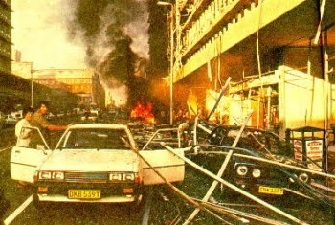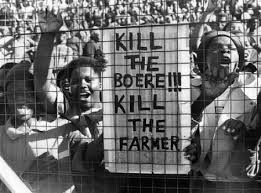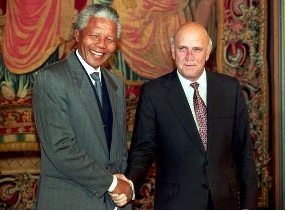In an opinion piece that ran in The Guardian last Friday, Britain's Deputy Prime Minister Nick Clegg took a stand for peace. In the article, he made the claim that the only way Israel and Hamas can find a permanent resolution to the discord that has spawned this harrowing period of violence is through negotiations in which Israeli and Hamas leaders sit down at the negotiating table together, face to face. To quote Clegg, "Military action has repeatedly failed to prevent rocket attacks against innocent Israelis. Modern history teaches that you can't shoot, occupy or besiege your way to lasting security. Peace only ever flows from sustained and stubborn engagement."
I write this post from Cape Town, South Africa, where as a student of African history and politics, I can't help but notice the striking similarities between what could happen in the Middle East and what did happen in this country. ***
 For over three decades, the Apartheid government (National Party) struggled to capture or kill Black "freedom fighters" whose militant doctrine permitted violence against innocents. Umkhonto we Sizwe (MK, or "Spear of the Nation"), the militant wing of the African National Congress (ANC), bombed civilian buildings, performed executions without due process, and killed innocent people using tactics that the United States government classified as "terrorism." It was ostensibly for these violent acts that South African police arrested and imprisoned MK's president and founder, Nelson Mandela.
For over three decades, the Apartheid government (National Party) struggled to capture or kill Black "freedom fighters" whose militant doctrine permitted violence against innocents. Umkhonto we Sizwe (MK, or "Spear of the Nation"), the militant wing of the African National Congress (ANC), bombed civilian buildings, performed executions without due process, and killed innocent people using tactics that the United States government classified as "terrorism." It was ostensibly for these violent acts that South African police arrested and imprisoned MK's president and founder, Nelson Mandela.
In 1990, the Apartheid government, buckling under intense boycotts, divestment, and sanctions that an international community desperate for justice had imposed on South Africa, declared an end to their policy of not negotiating with militant groups that opposed the state. In doing so, they released Mandela, the architect of militancy in South Africa, later recipient of the Nobel Peace Prize. By the middle of that year, F.W. de Klerk and the National Party had initiated talks, face to face, with Mandela and the ANC. The ultimate result was democracy, ushered into existence in 1994 by the country's first multiracial elections.
 To say that Afrikaners (the descendants of mainly Dutch settlers in South Africa) opposed the idea of equality for Blacks would be a gross understatement. Throughout the 20th century, Afrikaner children were indoctrinated with the notion of swart gevaar (black danger), or the idea that Blacks once empowered would use their newfound freedom to slaughter the White population that had repressed them. Though an Afrikaner concept of what could happen in the future, this White idea was inspired by the words of militant Black leaders. Indeed, many Black freedom fighters were actually clamoring to drive Whites into the sea. Popular slogans among ANC leaders (including current SA president Jacob Zuma) at the time were "One Boer, one bullet" and "Kill the Boer, kill the farmer," which became a popular song in Black circles. Moreover, the Black freedom movement in nearby Mozambique, where victorious guerrilla fighters in 1975 forced the White population of 250,000 to leave the country in 24 hours, imbued the hearts of White South Africans with a dread that something similar would happen to them should their government concede to Black demands.
To say that Afrikaners (the descendants of mainly Dutch settlers in South Africa) opposed the idea of equality for Blacks would be a gross understatement. Throughout the 20th century, Afrikaner children were indoctrinated with the notion of swart gevaar (black danger), or the idea that Blacks once empowered would use their newfound freedom to slaughter the White population that had repressed them. Though an Afrikaner concept of what could happen in the future, this White idea was inspired by the words of militant Black leaders. Indeed, many Black freedom fighters were actually clamoring to drive Whites into the sea. Popular slogans among ANC leaders (including current SA president Jacob Zuma) at the time were "One Boer, one bullet" and "Kill the Boer, kill the farmer," which became a popular song in Black circles. Moreover, the Black freedom movement in nearby Mozambique, where victorious guerrilla fighters in 1975 forced the White population of 250,000 to leave the country in 24 hours, imbued the hearts of White South Africans with a dread that something similar would happen to them should their government concede to Black demands.
Despite the strong political incentives that White leaders had to continue the cycle of violence between Black and White in the name of Apartheid, they chose a different course, one that had never been tried before in southern Africa between White and Black. By choosing to engage in talks as equals with the pragmatic Mandela, de Klerk likely saved his people from economic and possibly physical decimation. The White population today holds considerable financial clout in South Africa, but this result would not have been possible had Mandela not mollified the vociferous Black supremacist and Communistic tendencies in his party. Inviting Mandela to the table resulted in a significant moderation of the ANC's tactics to the point of nonviolence, despite popular Black calls to banish Whites and dismantle the South African state in favor of a new socioeconomic order with radical redistributions of wealth. ***
 To their detriment, Israel's leaders have heeded an archaic axiom that has continued to doom the people of Israel and Gaza to cyclical violence: "don't negotiate with Hamas." Yet in South Africa, de Klerk's decision to negotiate with Mandela who spoke for MK and the ANC likely saved the country from hundreds if not thousands of additional civilian deaths. As de Klerk said in a June 2014 speech, "We have learnt in South Africa after centuries of conflict, after decades of growing conflict that the only way to end conflict is for past enemies to sit around the table and talk to each other." Had de Klerk not opened the way for negotiations with the ANC, as Israel must do now with Hamas, there might still be blood being unnecessarily shed in South Africa.
To their detriment, Israel's leaders have heeded an archaic axiom that has continued to doom the people of Israel and Gaza to cyclical violence: "don't negotiate with Hamas." Yet in South Africa, de Klerk's decision to negotiate with Mandela who spoke for MK and the ANC likely saved the country from hundreds if not thousands of additional civilian deaths. As de Klerk said in a June 2014 speech, "We have learnt in South Africa after centuries of conflict, after decades of growing conflict that the only way to end conflict is for past enemies to sit around the table and talk to each other." Had de Klerk not opened the way for negotiations with the ANC, as Israel must do now with Hamas, there might still be blood being unnecessarily shed in South Africa.
Though the pre-democracy ANC and Hamas are not the same, there are striking similarities between the tactics that the militant wings of each organization have used to advance their respective agendas: "driving Whites into the sea," terrorizing civilians, charters that dedicate members to destruction of the occupying power. South Africa provides just one recent example of a time when occupiers approached bona fide terrorists to begin negotiations. As Clegg notes, Serbia and Ireland also produced "freedom fighters" who swore to annihilate the enemy but ultimately foreswore violence once given the opportunity to negotiate on level terms. In each of these cases, the effect of negotiations significantly moderated the tactics of radicals, hastening a peaceful resolution to the crisis.
If Israeli leaders are serious about peace, they must do whatever it takes to end the cyclical violence that has only distanced Israelis and Palestinians from a resolution. Indeed, if they are serious about peace, they will only achieve it through negotiations. Should Hamas negotiators demand nothing more than the destruction of Israel, then Israel has won the moral high ground. But the choreography and intermediaries of these complicated and ineffectual US/Egypt-brokered talks must end. When peace is at stake, no one is too good for talking.